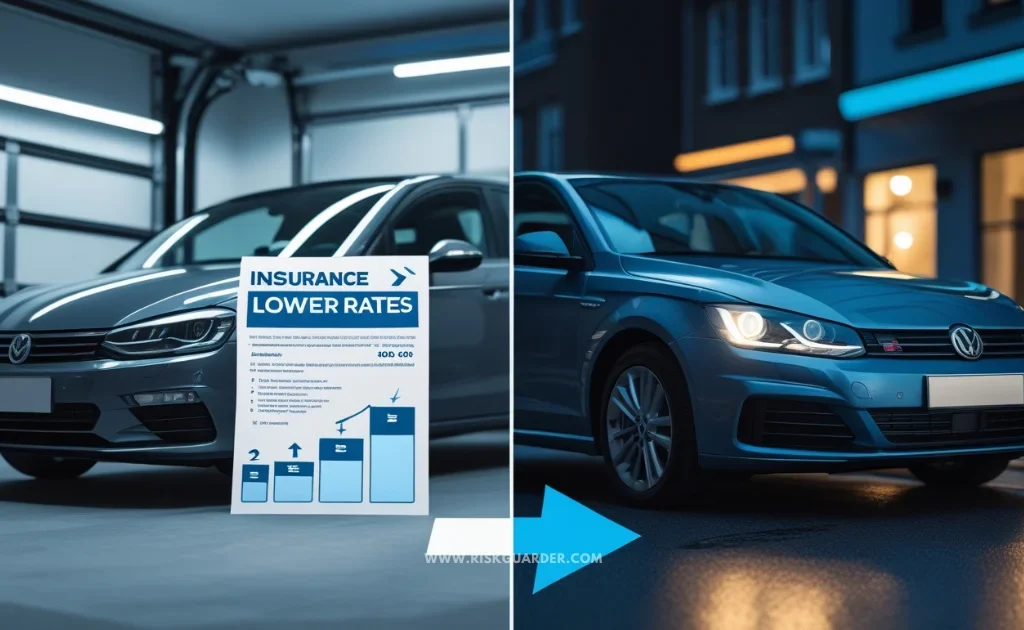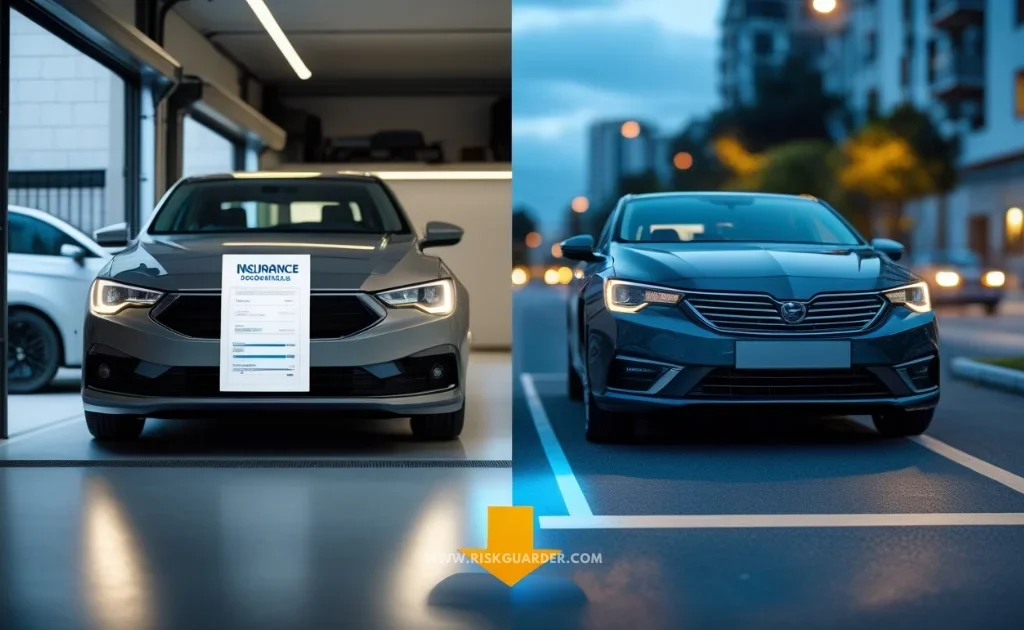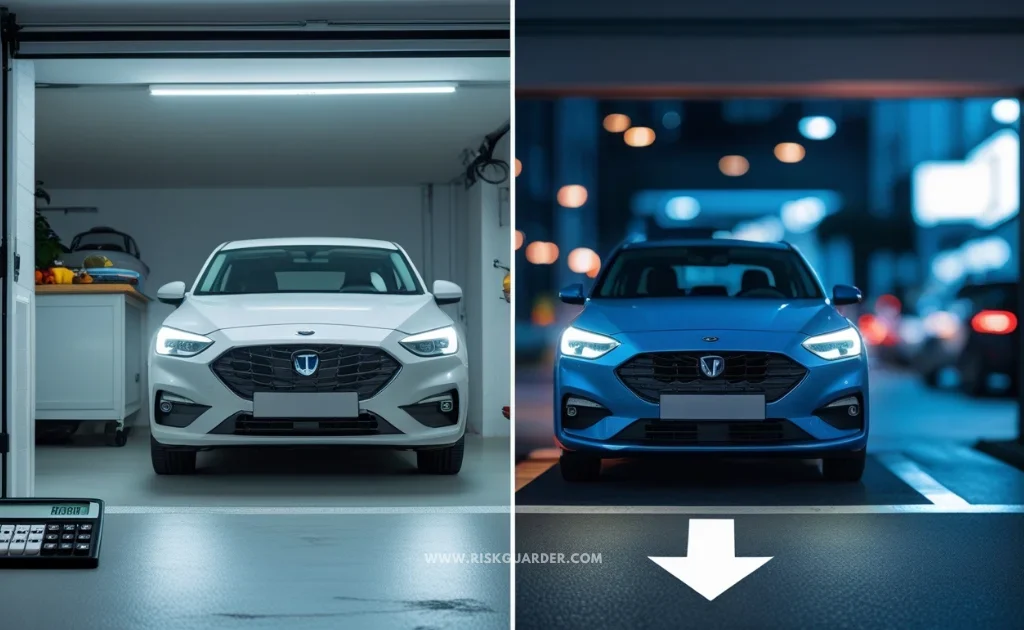Understanding auto insurance terms like “off-street parking” can be confusing, but it’s key to unlocking significant savings and ensuring proper coverage. If you’ve ever wondered why insurance companies ask where you park your vehicle or how your parking location affects your premium, you’re not alone. This article explores everything you need to know about the auto insurance term parking off street, its implications for your coverage, and how it might save you money.
What EXACTLY is “Off-Street Parking” in Auto Insurance Terms?

Off-street parking refers to any parking location that is not on a public road or street. This includes private driveways, garages, carports, and designated parking lots. Insurance companies distinguish this from “on-street parking,” which involves leaving your vehicle parked along public roads where it’s exposed to passing traffic and potentially higher risk.
This distinction is crucial in the insurance industry because parking location directly impacts the risk assessment for your vehicle. Insurance providers analyze statistical data showing that vehicles parked off-street typically face lower risks of theft, vandalism, and accidental damage than those parked on public streets.
Common variations of off-street parking in insurance terminology include:
- Garaged: Vehicle stored in an enclosed structure
- Driveway: Parked on private property but uncovered
- Carport: Covered but not fully enclosed structure
- Secure Lot: Designated parking areas with security features
The “Why”: How Parking Location Impacts Your Insurance Risk Profile
Insurance is fundamentally about risk assessment, and where you park directly influences several risk factors:
Theft & Vandalism Risk
Vehicles parked on public streets are approximately 3 times more likely to be stolen or vandalized compared to those in private garages. According to the National Insurance Crime Bureau, over 721,000 vehicles were stolen in 2019, with a significant percentage taken when parked on public streets.
Accidental Damage Risk
Street-parked vehicles face higher chances of being damaged in hit-and-run incidents, sideswipes from passing traffic, or damage from road debris. Off-street parking substantially reduces these exposures.
Weather-Related Damage
Hailstorms, falling branches, and flooding can cause significant damage to vehicles. Garages provide the best protection against these elements, while other off-street options offer varying degrees of shelter.
From an insurer’s perspective, these reduced risks translate to fewer claims, which is why many offer discounts for vehicles with secure parking arrangements.
Types of Off-Street Parking & Their Insurance Implications

Private Garage (Attached/Detached)
A private garage typically offers the best insurance discounts, potentially reducing comprehensive premiums by 5-15%. Insurance companies favor garages because they provide:
- Protection from weather elements
- Security from theft and vandalism
- Reduced exposure to accidental damage
Enhanced security features like automatic doors, surveillance systems, or alarm integration can further improve your risk profile.
Private Driveway
Parking in a private driveway is considered safer than street parking but offers less protection than a garage. Insurance discounts typically range from 2-7% for vehicles regularly parked in driveways, depending on your location and insurer.
Carport
A carport provides overhead protection but lacks the security of enclosed walls. Insurance companies generally view carports more favorably than open driveways but less favorably than garages, with potential discounts in the 3-8% range.
Secured/Gated Parking Lot/Garage
These facilities, common in apartment complexes or paid parking structures, feature security measures like:
- Gates requiring access codes
- Security personnel
- Surveillance systems
- Controlled entry/exit
Insurers typically offer moderate discounts for vehicles regularly parked in these facilities, especially in high-crime areas.
Unsecured Private Lot
While better than street parking, unsecured lots offer minimal security benefits. Expect modest premium reductions, if any, typically 1-3%.
The Big Question: How Much Can Off-Street Parking Save You?
The auto insurance term parking off street can significantly impact your premiums, but the exact savings vary considerably based on multiple factors:
| Parking Type | Potential Savings Range | Key Influences |
|---|---|---|
| Private Garage | 5-15% | Location crime rates, garage security |
| Driveway | 2-7% | Property security, location |
| Carport | 3-8% | Design, security features |
| Secured Lot | 3-10% | Security measures, location |
| Unsecured Lot | 1-3% | Location, lot design |
Your specific savings will depend on:
- Your ZIP code’s crime statistics
- Vehicle make and model (luxury and high-theft vehicles benefit more)
- Urban vs. rural location
- Your insurance carrier’s specific rating algorithms
“Garaging Location”: The Official Term & How Insurers Verify It
Insurance companies use the term “garaging location” to describe where your vehicle is primarily parked overnight. This location is critical information requested when:

- Getting initial quotes
- Purchasing a new policy
- Renewing existing coverage
- Moving to a new residence
Multiple Parking Locations: If you regularly park in different locations, you should disclose the primary overnight location where the vehicle spends most nights.
Verification Process: Insurers typically rely on honest disclosure but may verify your garaging location through:
- Address verification during claims
- Property records checks
- Visual confirmation during claim inspections
- Random verification programs
Misrepresenting your parking situation can lead to denied claims or policy cancellation, as it constitutes material misrepresentation.
Beyond Cost: Other Benefits of Off-Street Parking for Your Vehicle
The advantages of off-street parking extend beyond insurance savings:
- Reduced Exterior Wear: Less exposure to UV rays, acid rain, and environmental contaminants
- Enhanced Vehicle Longevity: Components like paint, rubber seals, and plastic parts age more slowly
- Personal Security: Reduced risk when entering/exiting your vehicle, especially at night
- Convenience: No searching for parking or dealing with street cleaning restrictions
When Off-Street Parking Might Not Significantly Lower Premiums
There are situations where the auto insurance term parking off street might not yield substantial savings:
- High-Crime Areas: If your garage is in a neighborhood with exceptionally high theft rates
- Poor Driving Record: Major violations or accidents may overshadow parking benefits
- Minimal Risk Difference: In very safe rural areas, the statistical difference between street and off-street parking risks might be negligible
Practical Steps: Informing Your Insurer & Getting the Best Rate
To maximize savings related to your parking situation:
- Update your insurer when your parking arrangements change
- Ask specific questions about different parking discount tiers
- Document your garage or parking facility with photos for your records
- Compare quotes from multiple insurers as some value off-street parking more than others
- Consider bundling home and auto insurance for additional discounts if you own a garage
FAQ: Your “Off-Street Parking & Auto Insurance” Questions Answered
Is a carport considered ‘garaged’ for car insurance? No. Most insurers classify carports separately from fully enclosed garages, offering intermediate discounts between driveway and garage rates.
Do I need to prove I have a garage for my car insurance? Typically not upfront, but you may need to verify during claims. Some insurers might request photos when offering substantial garage discounts.
What if I sometimes park on the street and sometimes in a driveway? You should declare your primary overnight parking location. If it’s split nearly equally, discuss this specific situation with your insurer.
Does parking in a work garage affect my personal auto insurance? Your work parking generally doesn’t impact premiums unless it’s also your primary overnight parking location.
Will my comprehensive coverage be cheaper with off-street parking? Yes, comprehensive coverage typically sees the most significant discounts from off-street parking since it covers theft, vandalism, and weather damage.
Conclusion
Where you park affects your car insurance costs significantly. Understanding the auto insurance term parking off street is essential for optimizing your coverage and potentially saving hundreds annually. Off-street parking reduces your vehicle’s exposure to numerous risks, from theft to accidental damage, making you a more attractive client for insurers.
Take time to review your current policy and confirm that your parking situation is accurately represented. If you’ve recently gained access to a garage, driveway, or secure parking facility, contact your insurance provider immediately—you might be eligible for immediate savings.
Get a Free Auto Insurance Quote Today to See Your Off-Street Parking Savings!






